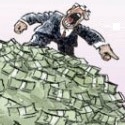|
No point bolding anything. This is some high grade bullshit through and through. We've got false equivalence, dog-whistle racism, confusing correlation with cause, confusing cause with effect, absurd fearmongering, attempts to taint the other side by associating them with another hated enemy, and outright lies. http://www.washingtontimes.com/news/2014/jan/8/egalizing-marijuana-recreational-use-colorado-wash/ quote:MILLER: Obama’s cultural legacy is legal marijuana blowing through America
|
|
|
|

|
| # ? May 23, 2024 21:25 |
|
I don't care how bright my lightbulb is, I want it to use 40 watts!
|
|
|
|
I would like to defend David Wong/Jason Pargin by pointing out that he also wrote this: http://www.cracked.com/blog/6-things-rich-people-need-to-stop-saying/ so I think makes a pretty solid case that he doesn't defines people's worth solely in terms of capitalism.
|
|
|
|
MisterBadIdea posted:I would like to defend David Wong/Jason Pargin by pointing out that he also wrote this: But he doesn't object strenuously enough to the way things are, and that makes him the enemy.
|
|
|
|
VideoTapir posted:No point bolding anything. This is some high grade bullshit through and through. We've got false equivalence, dog-whistle racism, confusing correlation with cause, confusing cause with effect, absurd fearmongering, attempts to taint the other side by associating them with another hated enemy, and outright lies. Jesus christ that was farrago of bullshit. The decriminalization of marijuana isn't really an important issue to me, and even I am outraged by the idea of people reading that nonsense and thinking any part of that fractally wrong masterpiece is worth considering.
|
|
|
|
Pththya-lyi posted:But he doesn't object strenuously enough to the way things are, and that makes him the enemy. Hey, to be fair to both sides, it's not wrong to be bothered by a guy who sees Alec Baldwin in Glengarry Glen Ross as an inspirational figure and not a soul-destroying symbol of everything wrong with the world.
|
|
|
|
So the WSJ and the Heritage Foundation have blessed us with their latest list of which countries are the most economically "free" around the world.Terry Miller posted:World economic freedom has reached record levels, according to the 2014 Index of Economic Freedom, released Tuesday by the Heritage Foundation and The Wall Street Journal. But after seven straight years of decline, the U.S. has dropped out of the top 10 most economically free countries.  Given the fact that the countries that are ahead of us all have universal health care (even tiny Mauritius) and some of them even provide free college (even tiny Mauritius), I guess the point of this article is to argue in favor of those things?
|
|
|
|
JohnClark posted:So the WSJ and the Heritage Foundation have blessed us with their latest list of which countries are the most economically "free" around the world.
|
|
|
|
JohnClark posted:So the WSJ and the Heritage Foundation have blessed us with their latest list of which countries are the most economically "free" around the world. Is there a methodology behind this or do they just pick whichever countries they like and put them towards the top? There's no reason for France to be #70.
|
|
|
|
Badger of Basra posted:Is there a methodology behind this or do they just pick whichever countries they like and put them towards the top? There's no reason for France to be #70. They subjectively grade each country on a 0-100 scale for four key values and then average the values. They basically make it up, but in a scientific way. http://www.heritage.org/index/about
|
|
|
|
JohnClark posted:So the WSJ and the Heritage Foundation have blessed us with their latest list of which countries are the most economically "free" around the world. Sort of an aside, but when did the WSJ become such a poo poo heap? As a child I recall it being held up as this paragon of reporting virtue, but ever since I was old enough to actually care its been producing reports like this garbage.
|
|
|
|
Caros posted:Sort of an aside, but when did the WSJ become such a poo poo heap? As a child I recall it being held up as this paragon of reporting virtue, but ever since I was old enough to actually care its been producing reports like this garbage. WSJ's editorial line has always been pretty conservative, but the actual reporting used to be pretty respectable. Then Murdoch bought it in 2007.
|
|
|
|
Silver2195 posted:WSJ's editorial line has always been pretty conservative, but the actual reporting used to be pretty respectable. Then Murdoch bought it in 2007. Ah. That would be it, yeah. 
|
|
|
|
Caros posted:Ah. That would be it, yeah. It was funny to hear execs cry as their tasteful all-text layouts and woodcut-style illustrations were replaced with color and graphics. But I also cried.
|
|
|
|
In Singapore public gatherings of more than five people need a government permit, there's no trial by jury and being found guilty of murder and certain drug crimes is a mandatory death sentence by hanging. The government is also a majority shareholder in most of the major domestic companies. But they have low taxes, so second freest!
|
|
|
|
A Fancy 400 lbs posted:In Singapore public gatherings of more than five people need a government permit, there's no trial by jury and being found guilty of murder and certain drug crimes is a mandatory death sentence by hanging. The government is also a majority shareholder in most of the major domestic companies. But they have low taxes, so second freest! No, see Singapore is more free, because heterosexuals in Singapore are not oppressed by the spectre of LGBT people walking the streets un-imprisoned, un-beaten, and un-murdered 
|
|
|
|
Popular Thug Drink posted:They subjectively grade each country on a 0-100 scale for four key values and then average the values. They basically make it up, but in a scientific way. Their "Labor Freedom" criteria is basically "How much exploitation of labor is possible" with higher levels of exploitation=more freedom. Of course. Some fucks posted:Six quantitative factors are equally weighted, with each counted as one-sixth of the labor freedom component:1
|
|
|
|
Thank god someone's fighting the evil that is mandate periods of notice of termination and severance pay.
|
|
|
|
Silver2195 posted:WSJ's editorial line has always been pretty conservative, but the actual reporting used to be pretty respectable. Then Murdoch bought it in 2007. The Laffer Curve was posted before the takeover was finalized (but after the bid).
|
|
|
|
VideoTapir posted:The Laffer Curve was posted before the takeover was finalized (but after the bid). I...just...what? I'm pretty sure that's not how you fit a curve.
|
|
|
|
VideoTapir posted:The Laffer Curve was posted before the takeover was finalized (but after the bid). What the gently caress is this
|
|
|
|
I love that the slope goes almost vertical by about 32% tax rate. Apparently all we need to do to double corporate tax revenue is cut 1% off the rate But don't bump it up 1% or we'll collect zero!
|
|
|
|
VitalSigns posted:No, see Singapore is more free, because heterosexuals in Singapore are not oppressed by the spectre of LGBT people walking the streets un-imprisoned, un-beaten, and un-murdered Actually I have heard for how awful they are in other areas they are at least passable on LGBT rights, all things considered. They do hold gay festivals and stuff without being beaten, and while homosexuality is still illegal there it's much like in the US right before Lawrence where it had become mostly symbolic. I still wouldn't want to live there but it's no Russia.
|
|
|
|
You might want to revisit your definition of "passable" if it includes criminalizing a minority of people with all of the enabling of police harassment of that minority that it entails. I can't tell if it's funnier that the WSJ defines freedom as "the freedom of the majority to oppress anyone they like" and "the freedom of the rich to exploit the poor"...or that they pretty obviously just begged the question and ranked countries by economic growth regardless of their policies so they could prove "freedom" helps the economy while simultaneously demanding America move away from the policies of the "most free" countries on the list.
|
|
|
|
A Fancy 400 lbs posted:In Singapore public gatherings of more than five people need a government permit, there's no trial by jury and being found guilty of murder and certain drug crimes is a mandatory death sentence by hanging. The government is also a majority shareholder in most of the major domestic companies. But they have low taxes, so second freest! Singapore is definitely politically authortarian, but makes economic attractiveness their first priority. It's possible to be socially repressive and also economically "free" (whatever that means). It's a weird little city-state, but definitely an attractive place for businesses to operate, especially if they want access to the Southeast Asian markets without all the regulatory/corruption baggage that comes from operating in those countries.
|
|
|
|
VitalSigns posted:You might want to revisit your definition of "passable" if it includes criminalizing a minority of people with all of the enabling of police harassment of that minority that it entails. That's the problem. At the end of the day, libertarians value property rights more than human rights.
|
|
|
|
losonti tokash posted:What the gently caress is this I was kind of pissed at the lack of context in your post at first, but there's so many things wrong with that graph that I believe that you've actually landed on the proper response. I'm surprised it doesn't have a Fox News bug floating in the corner of it and a news ticker at the bottom. They take the textbook definition of an outlier in the data, and then fit the  curve to it. The rest of the curve very obviously doesn't match up with the rest of the points at all. The axes are comparing two things that are not actually in direct relation to one another. It's comparing overall tax revenue to only one specific kind of tax as if it's the only tax operating in the economy. curve to it. The rest of the curve very obviously doesn't match up with the rest of the points at all. The axes are comparing two things that are not actually in direct relation to one another. It's comparing overall tax revenue to only one specific kind of tax as if it's the only tax operating in the economy.It's a thing of beauty. If I were a college professor I would use that graph as a test question with the free response question: "What's wrong with this graph?" There's so many technical things wrong with that graph that it wouldn't even be very ideological. You could agree with the Laffer curve and all the supply-side economics you want, and it doesn't make that graphic make any more sense.
|
|
|
|
VideoTapir posted:The Laffer Curve was posted before the takeover was finalized (but after the bid). The  Curve is always mind boggling with data points visible. I like this version better: Curve is always mind boggling with data points visible. I like this version better: See, no annoying data points to mess with your assumptions that way.
|
|
|
|
losonti tokash posted:What the gently caress is this http://online.wsj.com/news/articles/SB118428874152665452 That appears to be the original article, but I'm not sure given the paywall. Anyway, in 2007, they posted an editorial about corporate tax rates that included that...curve. When someone tries to use the WSJ (and only the WSJ) to support an argument now, I reply with that image. If someone tries to use IBD, you can respond with "the same IBD that claimed Stephen Hawking would be dead if he weren't an American?" There are some things that are just so goddamned stupid that letting them get through your editorial process ruins your credibility as a serious publication. edit: here we go: quote:WE'RE NUMBER ONE, ALAS The actual text of the editorial isn't much better than the graph. Gee, I wonder why Ireland could be collecting so much in corporate tax? Turns out you don't have to have a good guess to be an editor at the WSJ. VideoTapir fucked around with this message at 05:44 on Jan 16, 2014 |
|
|
|
Mo_Steel posted:The I don't understand why the first curve has to pass RIGHT THROUGH Norway even though it's a clear outlier. At least yours is making sure to pass through all points.
|
|
|
|
Nevvy Z posted:I don't understand why the first curve has to pass RIGHT THROUGH Norway even though it's a clear outlier. At least yours is making sure to pass through all points. Because if you don't pass through or at least very close to Norway then the curve only goes up, which kinda defeats their little theory.
|
|
|
|
But are those the actual data points used to generate the curve, or an assortment of example countries being compared to the curve?
|
|
|
|
Entropic posted:But are those the actual data points used to generate the curve, or an assortment of example countries being compared to the curve? They're data points that they're trying to fit a Laffer Curve to. There is no "actual" Laffer Curve, as it's inception was being drawn on a bar napkin with an unlabeled y axis and pretty much consists of "concave down parabola where y is zero at 0% and 100%".
|
|
|
|
Entropic posted:But are those the actual data points used to generate the curve, or an assortment of example countries being compared to the curve? The curve was generated from those actual data points, I believe by the Gaussian Greatest-Root-Mean-Squared-Error algorithm.
|
|
|
|
VitalSigns posted:The curve was generated from those actual data points, I believe by the Gaussian Greatest-Root-Mean-Squared-Error algorithm. More like the vector-line-tool-in-the-graphics program algorithm.
|
|
|
|
I was reading through RationalWiki the other day and saw that exact same Laffer curve picture and this guy does a pretty solid takedown of it with some more fail by the WSJ. The conclusion with only more maths involved is exactly the same as what's been said here: I'm pretty sure that's not how you fit a curve. http://www.brendan-nyhan.com/blog/2007/08/replicating-the.html http://www.brendan-nyhan.com/blog/2010/03/simplistic-wsj-minimum-wage-editorial.html Or some Barry Ritholtz whose title says it all, Art Laffer: Make Up Your Own Facts Here quote:In his OpEd, Mr. Laffer confuses causation with correlation, ignores market history, makes spurious argument, and simply make up crap as he goes along. http://www.ritholtz.com/blog/2010/06/art-laffer-make-up-your-own-facts-here/
|
|
|
|
My sister-in-law posted this on Facebook. It's either STDH.txt or poo poo that's easy to do if you are wealthy. http://qz.com/165716/how-i-made-sure-all-12-of-my-kids-could-pay-for-college-themselves/ How I made sure all 12 of my kids could pay for college themselves By Francis L. Thompson January 12, 2014 Francis L. Thompson is an engineer at Northrop Grumman Corp. He led the teams that designed the first Direct TV satellites and missile defense satellites, as well as ground control for these systems. The Thompson family photo. Or Photoshop, since they haven't all been in the same place since 1998. Courtesy of Francis Thompson My wife and I had 12 children over the course of 15 1/2 years. Today, our oldest is 37 and our youngest is 22. I have always had a very prosperous job and enough money to give my kids almost anything. But my wife and I decided not to. 4 I will share with you the things that we did, but first let me tell you the results: All 12 of my children have college degrees (or are in school), and we as parents did not pay for it. Most have graduate degrees. Those who are married have wonderful spouses with the same ethics and college degrees, too. We have 18 grandchildren who are learning the same things that our kids learned—self respect, gratitude, and a desire to give back to society. SM 2 We raised our family in Utah, Florida, and California; my wife and I now live in Colorado. In March, we will have been married 40 years. I attribute the love between us as a part of our success with the children. They see a stable home life with a commitment that does not have compromises. 1 Here’s what we did right (we got plenty wrong, too, but that’s another list): 3 Chores Kids had to perform chores from age 3. A 3-year-old does not clean toilets very well but by the time he is 4, it’s a reasonably good job. They got allowances based on how they did the chores for the week. We had the children wash their own clothes by the time they turned 8. We assigned them a wash day. When they started reading, they had to make dinner by reading a recipe. They also had to learn to double a recipe. The boys and girls had to learn to sew. Study time Education was very important in our family. 3 We had study time from 6 to 8pm every week day. No television, computer, games, or other activities until the two hours were up. If they had no homework, then they read books. For those too young to be in school, we had someone read books to them. After the two hours, they could do whatever they wanted as long as they were in by curfew. All the kids were required to take every Advanced Placement class there was. We did not let entrance scores be an impediment. We went to the school and demanded our kids be let in. Then we, as parents, spent the time to ensure they had the understanding to pass the class. After the first child, the school learned that we kept our promise that the kids could handle the AP classes. If children would come home and say that a teacher hated them or was not fair, our response was that you need to find a way to get along. You need find a way to learn the material because in real life, you may have a boss that does not like you. We would not enable children to “blame” the teacher for not learning, but place the responsibility for learning the material back on the child. Of course, we were alongside them for two hours of study a day, for them to ask for help anytime. Picky eaters not allowed We all ate dinner and breakfast together. Breakfast was at 5:15am and then the children had to do chores before school. Dinner was at 5:30pm. More broadly, food was interesting. We wanted a balanced diet, but hated it when we were young and parents made us eat all our food. Sometimes we were full and just did not want to eat anymore. Our rule was to give the kids the food they hated most first (usually vegetables) and then they got the next type of food. They did not have to eat it and could leave the table. If later they complained they were hungry, we would get out that food they did not want to eat, warm it up in the microwave, and provide it to them. Again, they did not have to eat it. But they got no other food until the next meal unless they ate it. We did not have snacks between meals. We always had the four food groups (meat, dairy, grain, fruits and vegetables) and nearly always had dessert of some kind. To this day, our kids are not afraid to try different foods, and have no allergies to foods. They try all kinds of new foods and eat only until they are full. Not one of our kids is even a little bit heavy. They are thin, athletic, and very healthy. With 12 kids, you would think that at least one would have some food allergies or food special needs. (I am not a doctor.) Extracurriculars All kids had to play some kind of sport. They got to choose, but choosing none was not an option. We started them in grade school. We did not care if it was swimming, football, baseball, fencing, tennis, etc. and did not care if they chose to change sports. But they had to play something. All kids had to be in some kind of club: Boy Scouts, Girl Scouts, history, drama, etc. They were required to provide community service. We would volunteer within our community and at church. For Eagle Scout projects, we would have the entire family help. Once we collected old clothes and took them to Mexico and passed them out. The kids saw what life was like for many families and how their collections made them so happy and made a difference. Independence When the kids turned 16, we bought each a car. The first one learned what that meant. As the tow truck pulled a once “new” car into the driveway, my oldest proclaimed: “Dad, it is a wreck!” I said, “Yes, but a 1965 Mustang fastback wreck. Here are the repair manuals. Tools are in the garage. I will pay for every part, but will not pay for LABOR.” Eleven months later, the car had a rebuilt engine, rebuilt transmission, newly upholstered interior, a new suspension system, and a new coat of paint. My daughter (yes, it was my daughter) had one of the hottest cars at high school. And her pride that she built it was beyond imaginable. (As a side note, none of my kids ever got a ticket for speeding, even though no car had less than 450 horsepower.) We as parents allowed kids to make mistakes. Five years before the 16th birthday and their “new” car gift, they had to help out with our family cars. Once I asked my son, Samuel, to change the oil and asked if he needed help or instruction. “No, Dad, I can do it.” An hour later, he came in and said, “Dad, does it take 18 quarts of oil to change the oil?” I asked where did he put 18 quarts of oil when normally only five were needed. His response: “That big screw on top at the front of the engine.” I said “You mean the radiator?” Well, he did not get into trouble for filling the radiator with oil. He had to drain it, we bought a radiator flush, put in new radiator fluid, and then he had to change the real oil. We did not ground him or give him any punishment for doing it “wrong.” We let the lesson be the teaching tool. Our children are not afraid to try something new. They were trained that if they do something wrong they will not get punished. It often cost us more money, but we were raising kids, not saving money. The kids each got their own computer, but had to build it. I bought the processor, memory, power supply, case, keyboard, hard drive, motherboard, and mouse. They had to put it together and load the software on. This started when they were 12. We let the children make their own choices, but limited. For example, do you want to go to bed now or clean your room? Rarely, did we give directives that were one way, unless it dealt with living the agreed-upon family rules. This let the child feel that she had some control over life. In it together We required the children to help each other. When a fifth grader is required to read 30 minutes a day, and a first grader is required to be read to 30 minutes a day, have one sit next to the other and read. Those in high school calculus tutored those in algebra or grade-school math. We assigned an older child to a younger child to teach them and help them accomplish their weekly chores. We let the children be a part of making the family rules. For example, the kids wanted the rule that no toys were allowed in the family room. The toys had to stay either in the bedroom or playroom. In addition to their chores, they had to all clean their bedroom every day (or just keep it clean in the first place). These were rules that the children wanted. We gave them a chance each month to amend or create new rules. Mom and Dad had veto power of course. We tried to be always consistent. If they had to study two hours every night, we did not make an exception to it. Curfew was 10pm during school nights and midnight on non-school nights. There were no exceptions to the rules. Vacation policy We would take family vacations every summer for two or three weeks. We could afford a hotel, or cruise, but did not choose those options. We went camping and backpacking. If it rained, then we would figure out how to backpack in the rain and survive. We would set up a base camp at a site with five or six tents, and I would take all kids age 6 or older on a three- to five-day backpack trip. My wife would stay with the little ones. Remember, for 15 years, she was either pregnant or just had a baby. My kids and I hiked across the Grand Canyon, to the top of Mount Whitney, across the Continental Divide, across Yosemite. We would send kids via airplane to relatives in Europe or across the US for two or three weeks at a time. We started this when they were in kindergarten. It would take special treatment for the airlines to take a 5-year-old alone on the plane and required people on the other end to have special documentation. We only sent the kids if they wanted to go. However, with the younger ones seeing the older ones travel, they wanted to go. The kids learned from an early age that we, as parents, were always there for them, but would let them grow their own wings and fly. Money and materialism Even though we have sufficient money, we have not helped the children buy homes, pay for education, pay for weddings (yes, we do not pay for weddings either). We have provided extensive information on how to do it or how to buy rental units and use equity to grow wealth. We do not “give” things to our children but we give them information and teach them “how” to do things. We have helped them with contacts in corporations, but they have to do the interviews and “earn” the jobs. We give birthday and Christmas presents to the kids. We would play Santa Claus but as they got older, and would ask about it, we would not lie. We would say it is a game we play and it is fun. We did and do have lists for items that each child would like for presents. Then everyone can see what they want. With the internet, it is easy to send such lists around to the children and grandchildren. Still, homemade gifts are often the favorite of all. The real world We loved the children regardless of what they did. But would not prevent consequences of any of their actions. We let them suffer consequences and would not try to mitigate the consequences because we saw them suffering. We would cry and be sad, but would not do anything to reduce the consequences of their actions. We were and are not our kids’ best friends. We were their parents. 14
|
|
|
|
|
That didn't really explain how the kids paid for college themselves at all. Maybe via part time jobs? Which they were able to use the funds from because wealthy mommy and daddy paid for EVERYTHING else? I honestly have no idea how they did it. Really, the title of the article matches the content about as well as "Man eaten by lawnmower while brushing teeth" would have.
|
|
|
|
Probably loans. He probably just means "we paid for everything their whole lives including the house in the neighborhood with the schools that are well funded." Given the site this is on though, I think it's less "Here's how to raise responsible kids, just be rich" and more "Here's how our kids didn't end up spoiled pieces of poo poo in rehab at 16 after murdering a family"
|
|
|
|

|
| # ? May 23, 2024 21:25 |
|
I like the last line where they claim they are not there to be friends with their children. They're right. They have to earn that. E: the parents have to, not the kids
|
|
|






























